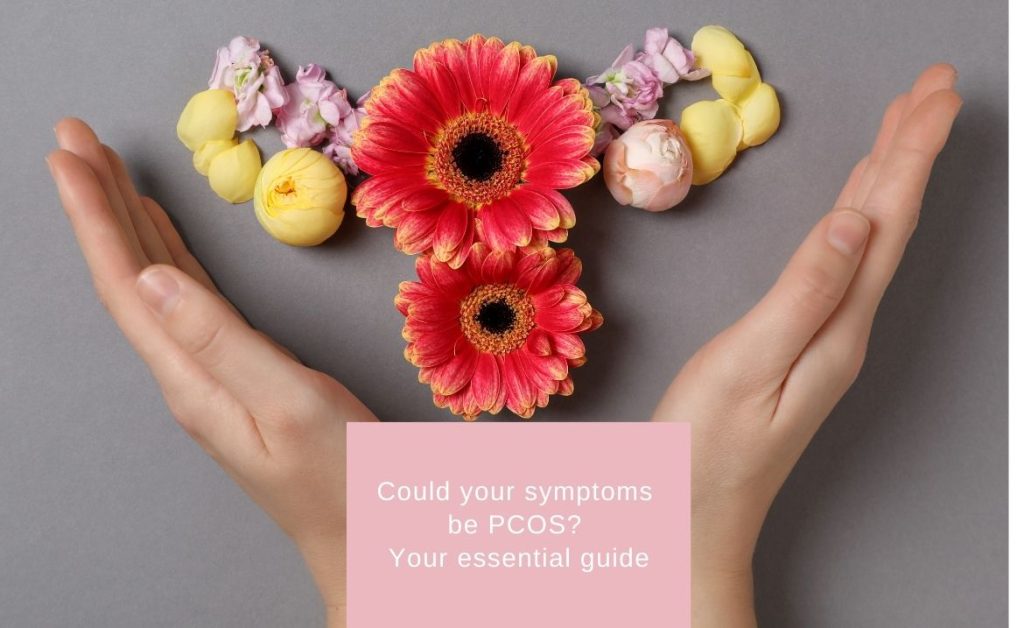Could your symptoms be PCOS? As you navigate through life and encounter numerous hormonal changes at every stage, you may find yourself questioning what your symptoms might mean. While some symptoms are easily identifiable, others aren’t as easy to pinpoint. Why? Because they can vary from woman to woman; and can change at different stages of life – such as with PCOS.
So, without further ado, let’s answer the question above.
What is polycystic ovary syndrome (PCOS)?
Polycystic Ovarian Syndrome, also known as PCOS, is a hormonal disorder that affects women of reproductive age. Starting in adolescence, the symptoms can change over time.
PCOS results from hormonal imbalances within the endocrine system. These imbalances cause excessive testosterone production while negatively affecting levels of the Follicle Stimulating Hormone (FSH) and Luteinising Hormone (LH). This imbalance results in limited egg production, disrupting a woman’s menstrual cycle and fertility.
According to the World Health Organization, PCOS affects an estimated 6–13% of reproductive-aged women. While up to 70% of affected women remain undiagnosed worldwide.
Symptoms of PCOS to look out for
As mentioned, the symptoms of PCOS can vary from woman to woman and change with time. But, there are some symptoms you can keep an eye out for. These include the following.
- acne,
- weight gain,
- excess hair growth,
- scalp hair loss,
- fertility difficulties,
- irregular periods,
- enlarged ovaries,
- obesity and difficulty losing weight,
- sleep apnoea (brief periods of not breathing whilst asleep),
- fatty liver, which can lead to liver disease,
- Insulin resistance, and
- mental health issues such as anxiety or depression.
In some cases, women are likely to present with other health conditions such as
- type 2 diabetes,
- high blood pressure,
- high cholesterol,
- endometrial cancer, or
- heart disease.
What causes PCOS and how is it diagnosed?
The exact cause is unknown, but there are two possible factors.
- Genetic inheritance (from the mother).
- Disrupted signals from the brain to the ovaries affect hormone production.
Tests to diagnose PCOS
There currently is no single test available to diagnose polycystic ovarian syndrome. In saying that, there are a few in-depth examinations your healthcare provider will carry out to determine if you have PCOS. These tests include the following.
- Medical history: As the first step, your doctor will ask you a few questions about your symptoms, any medications you are taking, and your medical history.
- Pelvic ultrasound: Your doctor will place a wand-like device in your vagina to look for follicles on the ovaries and check the thickness of the uterus lining (endometrium).
- Vaginal ultrasound: a wand-like device is placed in your vagina to look for follicles on the ovaries and check the thickness of the uterus lining (endometrium).
- Blood test: will allow your doctor to measure hormone levels, blood sugar, and other potential causes that may mimic PCOS.
Treatment options for PCOS
The good news is that a few treatment options are available for PCOS. The type of treatment prescribed will depend on your diagnosis. Some of the Treatment options include:
- Lifestyle changes: This includes a focus on a change to a healthier diet, regular physical activity, plenty of sleep, and a focus on emotional well-being.
- Medication: If you wish to become pregnant, your doctor may prescribe clomiphene citrate or follicle-stimulating hormone (FSH) injections for ovulation induction. Alternatively, to regulate your periods: contraceptive pills can help reduce male hormone levels and help improve symptoms. Other medications your doctor may prescribe include:
- Anti-diabetes drugs (Insulin-sensitising, metformin, and others).
- Weight loss drugs.
- Anti-depressants.
- Anti-anxiety drugs.
- Fertility treatment: If you are hoping to fall pregnant, your doctor may refer you to a fertility specialist. As an initial step, your doctor will recommend implementing lifestyle changes to help trigger ovulation. If this fails, your doctor will prescribe clomiphene citrate or follicle-stimulating hormone (FSH) injections for ovulation induction. Your doctor may also recommend Gonadotropin, or IVF if all else fails.
- Laparoscopic ovarian surgery (LOS): If you are of childbearing age and are not ovulating, LOS may be an option. While LOS will not treat PCOS, it will assist in inducing ovulation.
- Bariatric (weight loss) surgery: If you are unable to lose weight despite all efforts, while bariatric surgery is not a cure for polycystic ovarian syndrome, your doctor may recommend bariatric surgery to assist in restoring your menstrual cycle and reduce the symptoms.
Seeking medical advice and support
Dr Kothari will take the time to listen to and understand your concerns. After careful observation and diagnosis, he will provide you with a tailored treatment to suit your circumstances and will guide you and support you throughout your journey.
In the meantime, you may also
consider
PCOS help and support groups and networks, both locally and online.
PCOS support resources:
Your next steps
For more information, or diagnosis and treatment contact our team on 02 4225 1999

